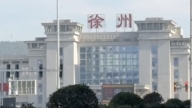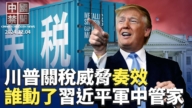新唐人2011年11月24日讯】湖南一家民企老板陈荣原来想揭露一场招标的“猫腻”,却牵扯出湖南省财政厅等机关在政府采购中,为了花掉预算而“突击花钱”的黑幕。陈荣将三个厅局单位同时告上了法庭,此案被称为“史上最牛的民告官案”。
长沙市“海韵琴行有限公司”总经理陈荣,将湖南省财政厅、文化厅、省直机关事务局三厅局告上法庭,他提出,这三家单位在2010年底一次政府采购中,招标过程有猫腻,使得原本1500万元可以完成的采购,最后却以3000万元成交。不买对的,只买贵的,损害了社会公共利益。
据陈荣介绍,2010年9月29号,湖南省文化厅在政府采购网上发布采购公告。采购内容下标注说:投标人投标报价必须在项目采购内容的预算单价范围内,凡超出预算单价上下限的,不能进入下轮评标程序。
曾参加过多次政府采购投标的陈荣表示,采购方提前设定投标价格下限的做法违法,并因此使得原本仅需要1500万左右的采购项目,最后的成交价居然超过了 3000多万元。而且评标过程并没有重视产品质量,大型生产厂家的优质产品纷纷被淘汰,而一些村办个体小厂的杂牌产品反而最后中标。
虽然“海韵琴行”一张状纸将三厅局告上了法庭,不过,真正引发舆论抨击的却是湖南省政府官员的辩解。
湖南省文化厅规划财务处处长丁宇近期对《法制日报》记者解释说,这次采购同时限制了商品的最高报价和最低限价,原因除了“保障质量”,还有“预算执行的需要”。因为如今不仅有预算编制,还有预算执行。如果预算没有执行完,财政就要收回,必然会影响第二年的预算编制。
因此,各级政府部门、各个单位宁可花大钱,也不愿意省钱。年末“突击花预算”成为了普遍现象。
另一名不愿透露姓名的湖南供应商表示,政府采购中还有部分官员的灰色收益。甚至评标专家也能藉由“公关费”捞取灰色收入。
独立学者、政论作家杜导斌:“主要就是预算不公开,不透明。没有经过议会式的公开辩论。也没有第三方的那种相当公平的审计机构。财政局它也是跟它们都在一个体制之内,它那个监管呢,它是非常乏力的。”
就在一个半月前,长沙市天心区人民法院,以“海韵公司”没有在知道他的权利遭受侵害之日起7个工作日内提出质疑,超出了政府采购法规定的期限为由,驳回了“海韵公司”的全部诉讼请求。但陈荣决心继续上诉,目前此案已上诉至长沙市中院。
不过杜导斌认为,如果没有来自体制外的监督,这个财务问题要审计好是不可能的。
独立学者、政论作家杜导斌:“首先这个负责审查预算和决算的那个代议机关,必须是直接来自于民众的,不能是官员审官员。只有预算的决定权给这样的人,才可能起到真正的审查、审计的那种作用;第二个就是财政整个预算,从大的项目到细的科目,到账单要全部对社会,在阳光下算;第三个就是媒体必须是公开,是自由的媒体,不能是受制于当局,受制于某些个人的媒体。”
北京理工大学教授胡星斗在回答《德国之声》有关“三公消费”问题时也表示,“过去有无数自上而下的规定、文件、讲话等等,但是效果并不好,而且滥用公款的现象反而愈演愈烈。关键还是民众的监督,以及阳光行政和阳光财政。”
他建议,当局应当允许公民进行财政公议诉讼。
新唐人记者易如、尚燕、郭敬采访报导。
Inside Story of CCP “Making Effort to Spend Budgets"
A Hunan-based private company boss, Chen Rong,
originally intended to expose an under-the-table
government procurement bidding process,
but triggered off the uncovering of the inside story of
“making an effort to spend budgets” by Hunan provincial
organs of Chinese Communist Party (CCP) authorities.
Taking the three official organs to court, Chen was
thus labeled as " the most powerful civilian suing government case in history".
Changsha-based Haiyun Piano Store general manager,
Chen Rong, sued Hunan Provincial Department of Finance,
Provincial Cultural Department of Culture, and
Provincial Civil Affairs Bureau.
Chen stated that in late 2010, an official procurement
coincided with further under-the-table bidding deals.
The procurement that cost RMB15 million, was concluded
with RMB 30 million, which harmed public interest.
Chen said, on the 29th September, 2010, Hunan Provincial
Department of Culture issued a procurement notice on its government procurement website.
Its annotation said, bidders’ bid quotations should
be within the procurement’s unit-price budget range.
Any quotation that exceeds the upper or lower price limits
of the unit-price budgets, shall not enter the following tender evaluation phase.
As a bidder that had attended many government
procurement biddings, Chen said that the purchaser’s
setting in advance the lower bidding price limits was
against the law.
The practice hikes the final transaction cost from
RMB15 million to over RMB 30 million.
Moreover, the tender evaluation was not conducted
on the basis of product quality.
High-quality products offered by larger manufacturers
were weeded out,
but inferior products from some village-run or
privately-owned plants won the bidding.
Though the three official organs were taken to court,
the real cause that incited public criticism came from Huan provincial officials’ justification.
Financial planning director of Hunan Provincial Department
of Culture, Ding Yu, recently explained to Legal Daily that
the procurement bidding set both the upper and lower limits
for bid quotations to “guarantee the quality",
and also to “meet the demands of budget enforcement."
This was because currently, not only is the budget planned,
but was implemented, too.
If the budget quotas were not used up, the public finance
would take back the remaining portion, which would naturally affect next-year’s budget planning.
So, all CCP official organs and offices would rather
spend a great deal, and not save a penny instead.
The end of year “making an effort to spend budget" has
been a common phenomenon across China.
An anonymous Hunan-based supplier said that
the government procurements could bring gray income to some officials.
Even tender evaluation experts can gain extra incomes
in the name of “public relations fees".
Du Daobin (Independent scholar and political commentary
writer): “The main problem is that the budget is not made public, nor is it transparent,
without going through a process similar to parliamentary debate.
Nor exists an independent third-party audit agency.
The Financial Bureau runs within the same CCP system,
carrying out a very poor regulatory function. “
One and a half months ago, the CCP People’s Court of
Tianxin District in Changsha city, overruled Haiyun Piano Store’s claims, saying that
Haiyun did not sue within seven days of the date
when being aware of the infringement of rights,
and Haiyun’s accusation exceeded the time limit specified
by the government procurement law.
But Chen Rong is determined to continue the appeal.
The appeal has so far been lodged to the
Intermediate People’s Court of Changsha city.
However, writer Du Daobin believes that without
third-party supervision, it is impossible to have financial problems well audited.
Du Daobin (Independent scholar and political commentary
writer): “First of all, the Legislature in charge of budget review and
final accounts auditing should be an independent party,
not an official organ.
Only giving the final-say to such an organ,
can the audit function be truly playing its role.
Secondly, to make public the integral budget of the financial
departments, which should range from large projects to small account titles, even to expense billing.
Thirdly, the media must own its freedom, not be subject to
the authority or to certain individuals. “
Beijing Institute of Technology professor, Hu Xingdou,
answered Voice of Germany’s questions on “three public expenditures",
saying, “In the past, numerous top-down rules, instructions,
speeches and the like were issued, but without providing any good effect.
Abuse of public funds has been intensified.
the key still lies in public supervision, transparent administration and transparent public finance. “
Prof. Hu suggested that the authorities should
allow citizens to file public interest litigations related to public finances.
NTD reporters Yi Ru, Shang Yan and Guo Jing.





























